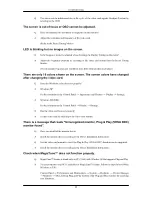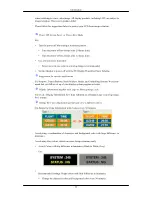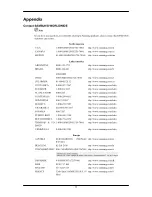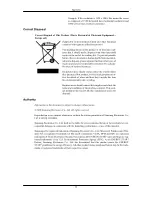
Asia Pacific
MALAYSIA
1800-88-9999
http://www.samsung.com/my
NEW ZEALAND
0800 SAMSUNG(0800 726 786) http://www.samsung.com/nz
PHILIPPINES
1800-10-SAMSUNG(726-7864) http://www.samsung.com/ph
SINGAPORE
1800-SAMSUNG(726-7864)
http://www.samsung.com/sg
THAILAND
1800-29-3232
02-689-3232
http://www.samsung.com/th
TAIWAN
0800-329-999
http://www.samsung.com/tw
VIETNAM
1 800 588 889
http://www.samsung.com/vn
Middle East & Africa
SOUTH AFRICA
0860-SAMSUNG(726-7864)
http://www.samsung.com/za
TURKEY
444 77 11
http://www.samsung.com/tr
U.A.E
800-SAMSUNG(726-7864)
8000-4726
http://www.samsung.com/ae
Terms
Dot Pitch
The image on a monitor is composed of red, green and blue dots.
The closer the dots, the higher the resolution. The distance be-
tween two dots of the same color is called the 'Dot Pitch'. Unit:
mm
Vertical Frequency
The screen must be redrawn several times per second in order to
create and display an image for the user. The frequency of this
repetition per second is called the Vertical Frequency or Refresh
Rate. Unit: Hz
Example: If the same light repeats itself 60 times per second, this
is regarded as 60 Hz.
Horizontal Frequency
The time to scan one line connecting the right edge to the left edge
of the screen horizontally is called the Horizontal Cycle. The in-
verse number of the Horizontal Cycle is called Horizontal Fre-
quency. Unit: kHz
Interlace and Non-Interlace
Methods
Showing the horizontal lines of the screen from the top to the bot-
tom sequentially is called the Non-Interlace method while show-
ing odd lines and then even lines in turn is called the Interlace
method. The Non-Interlace method is used for the majority of
monitors to ensure a clear image. The Interlace method is the same
as that used in TVs.
Plug & Play
This is a function that provides the best quality screen for the user
by allowing the computer and the monitor to exchange informa-
tion automatically. This monitor follows the international standard
VESA DDC for the Plug & Play function.
Resolution
The number of horizontal and vertical dots used to compose the
screen image is called the 'resolution'. This number shows the ac-
curacy of the display. A high resolution is good for performing
multiple tasks as more image information can be shown on the
screen.
Appendix
58


































